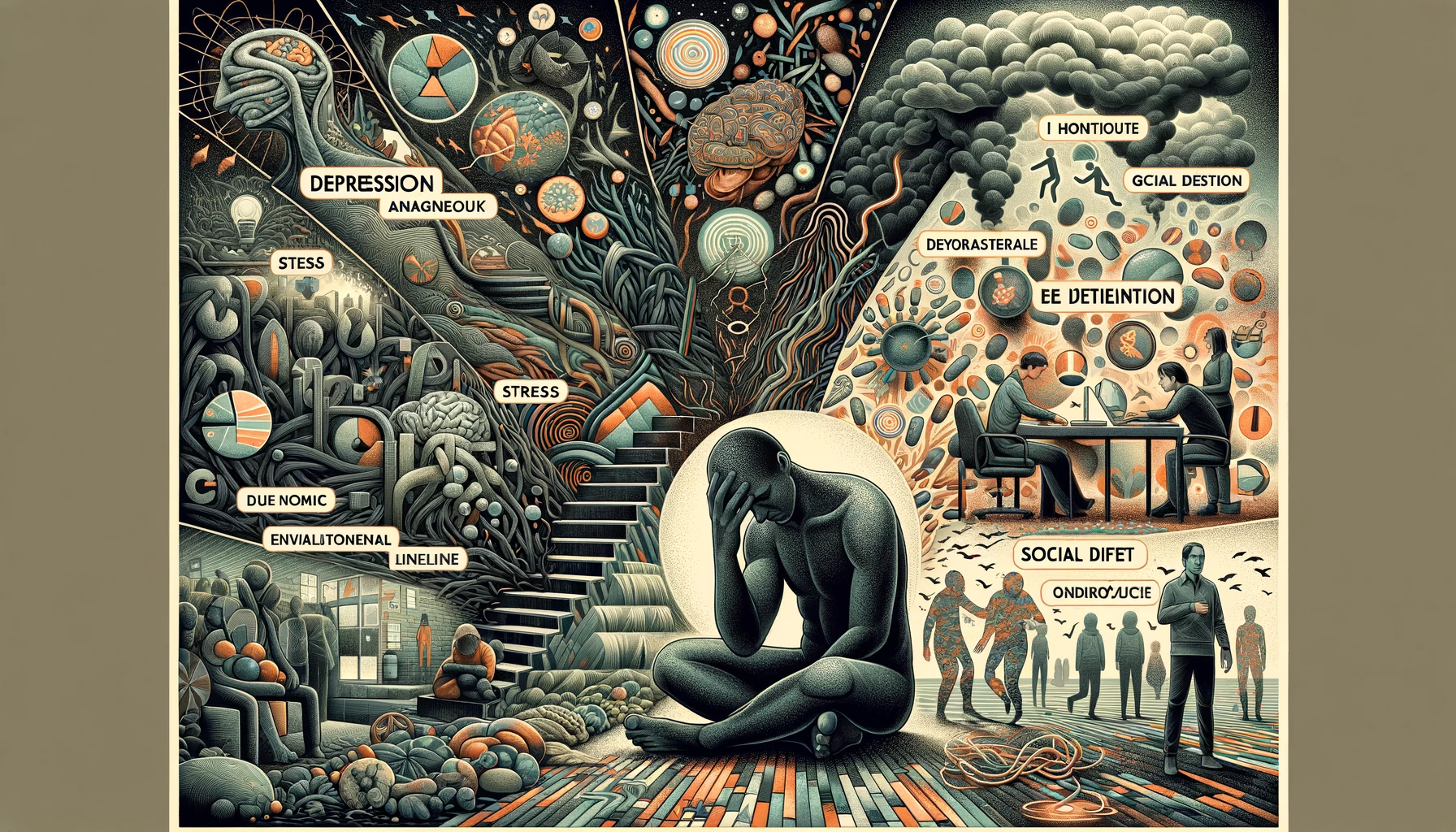
What Causes Depression and Anxiety
Depression and anxiety are two of the most common mental health conditions, affecting millions of people worldwide. Understanding the potential causes of these disorders is crucial for seeking appropriate treatment and managing symptoms effectively.
From imbalances in the brain’s chemistry to stressful life events, a range of factors can contribute to the development of depression and anxiety. By exploring these underlying causes, individuals can gain valuable insight into their mental health and take proactive steps to address these challenges.
Key Takeaways
- Depression and anxiety are widespread mental health conditions that can significantly impact an individual’s well-being.
- Identifying the potential causes of these disorders is essential for effective treatment and symptom management.
- Biological factors, such as brain chemistry imbalances and genetic predisposition, can play a key role in the onset of depression and anxiety.
- Environmental and lifestyle factors, including stress, trauma, substance abuse, and poor diet, can also contribute to the development of these mental health issues.
- Understanding the multifaceted nature of depression and anxiety is the first step towards achieving better mental health and well-being.
Biological Factors Contributing to Depression and Anxiety
Imbalances in the brain’s chemistry, particularly the levels of neurotransmitters like serotonin, dopamine, and norepinephrine, can contribute to the development of depression and anxiety. These chemical messengers play a crucial role in regulating mood, and disruptions in their levels can lead to mood disorders.
Genetics and Family History
Genetic and family factors can also play a significant role in the development of depression and anxiety. Research has shown that individuals with a close family member who has experienced these conditions are more likely to develop them as well, suggesting a hereditary component.
Medical Conditions and Medications
Certain medical conditions, such as thyroid disorders, chronic pain, and neurological diseases, can increase the risk of depression and anxiety. Additionally, some medications, including certain antidepressants, blood pressure drugs, and corticosteroids, can have side effects that may contribute to the development of these mental health issues.
Depression and Anxiety: Environmental and Lifestyle Triggers
Stressful and traumatic life events, such as the loss of a loved one, financial troubles, relationship difficulties, or experiences of abuse or neglect, can significantly increase the risk of developing depression and anxiety. These events can trigger physiological and psychological responses that make individuals more vulnerable to these mental health conditions. Exposure to adverse life circumstances and post-traumatic stress disorder (PTSD) are well-established risk factors for both depression and anxiety.
Substance Abuse and Addiction
Substance abuse and addiction, whether to alcohol, illegal drugs, or even prescription medications, can both contribute to and be a consequence of depression and anxiety. Individuals may turn to substances as a means of self-medicating, but this can ultimately worsen their mental health and create a vicious cycle. The use of drugs and alcohol as a coping mechanism can further exacerbate feelings of despair, anxiety, and poor well-being.
Poor Diet and Lack of Exercise
Lifestyle factors, such as a poor diet and lack of physical activity, can also play a role in the development of depression and anxiety. A diet low in essential nutrients and a sedentary lifestyle can negatively impact brain function and mood, contributing to the onset of these mental health conditions. Maintaining a balanced, nutrient-rich diet and engaging in regular exercise have been shown to have a positive effect on mental well-being, helping to alleviate symptoms of depression and anxiety.
FAQ
What are the biological factors that contribute to depression and anxiety?
Imbalances in the brain’s chemistry, particularly the levels of neurotransmitters like serotonin, dopamine, and norepinephrine, can contribute to the development of depression and anxiety. Genetics and family history, as well as certain medical conditions and medications, can also increase the risk of these mental health issues.
How do environmental and lifestyle factors trigger depression and anxiety?
Stressful and traumatic life events, such as the loss of a loved one, financial troubles, or experiences of abuse, can significantly increase the risk of developing depression and anxiety. Substance abuse and addiction, as well as a poor diet and lack of physical activity, can also contribute to the onset of these mental health conditions.
What are the common symptoms of depression and anxiety?
Symptoms of depression may include persistent feelings of sadness, hopelessness, loss of interest in activities, fatigue, changes in sleep or appetite, and difficulty concentrating. Symptoms of anxiety may include excessive worry, nervousness, restlessness, irritability, and physical symptoms like rapid heartbeat, sweating, and muscle tension.
How can I seek help for depression and anxiety?
If you or someone you know is experiencing symptoms of depression or anxiety, it’s important to seek professional help. This may include consulting with a mental health professional, such as a therapist or counselor, who can provide a comprehensive evaluation and recommend appropriate treatment options, which may include therapy, medication, or a combination of both.
What are some effective coping strategies for managing depression and anxiety?
Effective coping strategies for managing depression and anxiety may include practicing stress management techniques, such as meditation, deep breathing, or progressive muscle relaxation; engaging in regular exercise and maintaining a healthy lifestyle; prioritizing self-care activities, such as getting enough sleep and eating a balanced diet; and building a strong social support network.